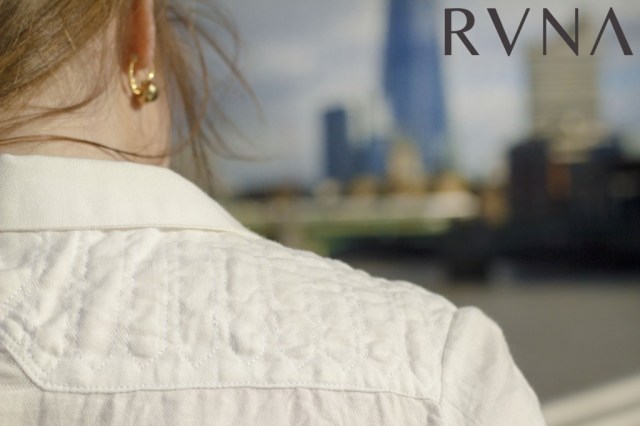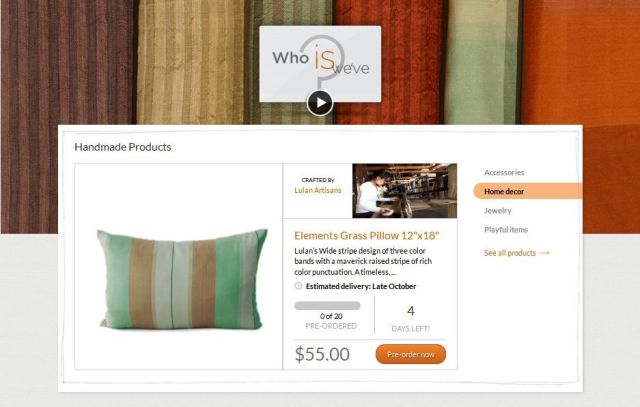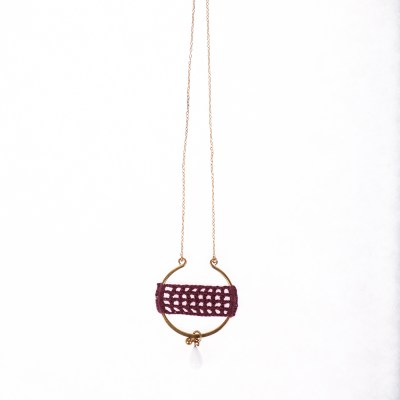Is #FeelGoodFriday a thing? With the launch of e-commerce site Zady last month, we’ve been keeping our eye on other conscious consumerism startups in the pipeline. Here for your consideration, three newcomers to the transparency scene and one new program from the three-year-old Everlane.
Such startups don’t come without skeptics. It’s hard to shake the feeling that socially conscious ecommerce sites are just paying lip service to ethical production. Videos can be fudged, factory workers asked to smile, manufacturing cycle infographics simplified and rendered in cheery colors. Without actually visiting a production site in person, who’s to say we’re not all being played? It’s hard to know for sure.
But as Nielsen pointed out, consumers are increasingly willing to spend more on goods from socially conscious companies. Savvy entrepreneurs should be looking to capitalize on this. And they are.
Given Goods
Newly launched e-commerce site Given Goods is an impact-driven decor, kitchen, and accessories site. Rather than revealing the production process, Given Goods’ product descriptions speak to who benefits from each purchase. It may be the makers themselves — as with a glassware company that gives jobs to unemployed individuals in Idaho — or the brand may donate a percentage of each purchase to a particular organization or charity. The site includes the all-but-obligatory impact map to help consumers visualize where their goods are coming from.
RVNA
 A startup called Runa (stylized RVNA) is opening an Indiegogo campaign in October to raise around $20,000 to get its Colombia-sourced fair trade clothing line off the ground. They are promising three things on the transparency and impact front: showing customers exactly how much the main worker in the production process was paid, a video profile of said worker upon purchase, and follow-up videos to track that worker’s progress. The micro-collection they’re showing now has a clean, simple aesthetic, and with it Runa is hoping to shake the somewhat frumpy image of fair trade clothing. The startup’s target audience is young professionals in their 20s and 30s — a cohort that can and will pay for ethically produced goods. If they meet most of their crowdfunding goal, the plan is to have the e-commerce site up and running by March 2014.
A startup called Runa (stylized RVNA) is opening an Indiegogo campaign in October to raise around $20,000 to get its Colombia-sourced fair trade clothing line off the ground. They are promising three things on the transparency and impact front: showing customers exactly how much the main worker in the production process was paid, a video profile of said worker upon purchase, and follow-up videos to track that worker’s progress. The micro-collection they’re showing now has a clean, simple aesthetic, and with it Runa is hoping to shake the somewhat frumpy image of fair trade clothing. The startup’s target audience is young professionals in their 20s and 30s — a cohort that can and will pay for ethically produced goods. If they meet most of their crowdfunding goal, the plan is to have the e-commerce site up and running by March 2014.
Everlane
Everlane has built its brand on a clean, classic aesthetic and on transparency in the manufacturing process of its goods. Through their Everlane Explores videos, they’ve been working to give customers a behind-the-scenes (albeit edited) look at the factories they work with. According to founder and CEO Michael Preysman, the e-tailer is beginning to administer quality of life surveys and happiness among workers at those factories, with the goal of using those findings to improve working conditions. The first set of results is due back in a month, Preysman said, and Everlane will then be rolling out more surveys over the next six months.
WE’VE

WE’VE, a new ecommerce site for home decor and accessories, launched last week with a focus on showing consumers the manufacturing process behind the products on the site. (The site is open to the public now, although you have to request an invite code.) The site draws its product from artisan makers, and in order to ensure demand and fair pricing, a pre-order minimum has to be filled before entering production. Once it does, WE’VE sends out videos to buyers walking them through the production process step by step.
